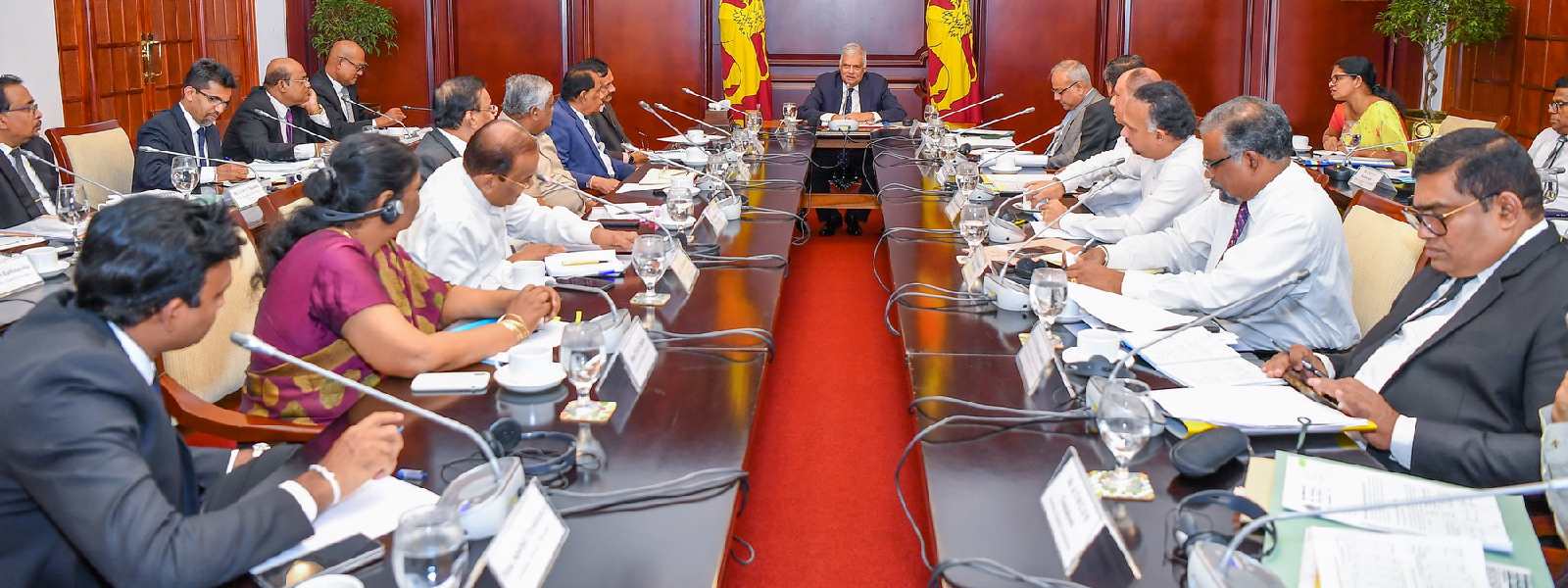President Ranil Wickremesinghe announced the development of a novel approach aimed at optimizing the operations of the Local Council, Provincial Council, and Central Government sectors, all geared towards curbing financial inefficiencies. The President directed officials to devise this new mechanism, placing a distinct emphasis on the efficacy of these three entities.
Furthermore, President Wickremesinghe instructed officials to collaborate with Provincial Governors and Chief Secretaries in order to draft a comprehensive report on this matter within a month. These consultations are intended to ensure a well-rounded perspective before formulating the new approach.
These assertions were made during a recent meeting at the Presidential Secretariat, where President Wickremesinghe engaged with Provincial Governors and Chief Secretaries. The purpose of this assembly, held yesterday (17) afternoon, was to deliberate on the forthcoming administrative procedures associated with the provincial council system.
Expressing his views further, the President said;
Today, I’ve gathered all of you to engage in a discussion about the governance framework associated with the empowerment of Provincial Councils. Our focus needs to be on how to progress in this direction while also considering the administrative structure of the central government.
In certain instances, identical services are delivered by the three different tiers of administration: the Local Council, the Provincial Council, and the Central Government. Take, for instance, tasks like drain maintenance, electric pole installation, and road construction. Unfortunately, this redundancy results in significant financial wastage. If this is indeed the case, it becomes imperative to establish a fresh mechanism that centres around the coordination of these three entities.
I have recommended the formulation of a novel system within a month’s time, following consultations with the Provincial Chief Secretaries. This step is crucial since the provincial councils are presently non-operational and bereft of ministers. Consequently, you, the Provincial Governors, hold complete governing authority within the current provincial council system.
The previous year posed considerable challenges for us, an experience I believe we need not relive. As we strive to tackle the economic predicaments of the nation, our efforts must also encompass the restoration of the country’s governance structure.
Of notable significance is that grassroots services are overseen by the provincial councils, while district-level services fall under the purview of the central government. It’s essential that these undertakings progress harmoniously, without competing with each other, as we endeavour to offer these services jointly.
The food security program has now been successfully rolled out across the entire nation. As a result, we are optimistic about a bountiful harvest in the upcoming season. Despite a decrease in the prevalence of malnutrition among the population compared to last year, we mustn’t become complacent.
It’s worth noting that the Aswasuma program played a pivotal role in reducing malnutrition among the citizens of our country. The advantages stemming from the Aswasuma initiative extend beyond mere prosperity.
Given that the parliamentary session will continue until the close of the next year, it’s essential to extend the opportunity for parliamentarians to engage in local government matters. Additionally, plans are underway to establish a dedicated advisory committee that will collaborate closely with the governor.
Simultaneously, we are also addressing the powers of provincial councils as outlined in the 13th Amendment of the constitution. Notably, a special emphasis has been placed on enhancing education, professional training endeavours, and the establishment of new universities in each respective province.
To bolster the growth of the tourism industry, there are intentions to establish tourism boards at the provincial level. It’s also pertinent to mention that numerous programs aimed at incentivizing investors and entrepreneurs are anticipated to be implemented at the provincial level in the future.
Mr. Saman Ekanayake, the Secretary to the President, expressed his anticipation for the backing of the Presidential secretariat in addressing the challenges confronted by Provincial Councils in their interactions with the Central Government.
During the discourse, the provincial governors in attendance conveyed to the President the urgent requirement to promptly fill teacher vacancies within their respective provincial council jurisdictions. They noted the presence of surplus teachers in certain schools, juxtaposed with teacher shortages in others. In response, they sought the implementation of a teacher exchange program to rectify this imbalance.
Highlighting the issue of incomplete two-story buildings constructed under the “the best school is the nearest school” concept, the governors emphasized instances of building deterioration and appealed for the formulation of a suitable program to address this concern.
The governors also drew attention to stalled development projects for which allocations had been designated. Regrettably, the funds for some of these projects were still pending.
In addition to these matters, the Provincial Governors made a request to the President to facilitate opportunities for advancing the tourism industry at the provincial level.


